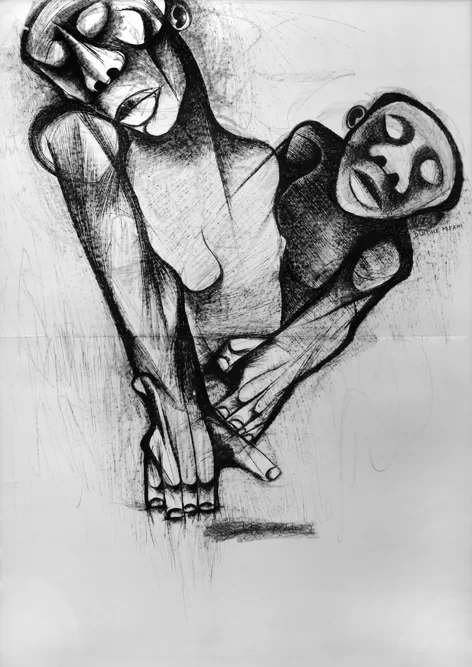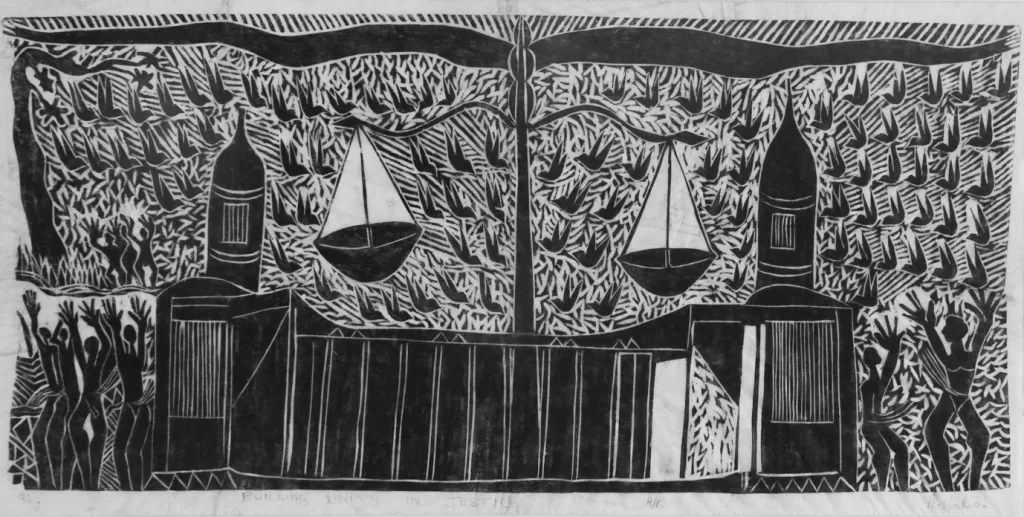Apartheid Museum new temporary exhibition
Resilience and Reflection – celebrating 30 years of democracy
A partnership between the Apartheid Museum, the Australian High Commission and the Ifa Lethu Foundation
Johannesburg, 9 April 2024: To mark 30 years of South Africa’s democracy, the Apartheid Museum is proud to be partnering with the Ifa Lethu Foundation to showcase an exhibition of selected works from its esteemed collection. The collection of artworks repatriated from 16 countries represents a record of life in the townships in the dark days of apartheid. That black artists created this art is extraordinary, and that it has been preserved and returned to South Africa, is something of a miracle.

Dr Narissa Ramdhani, Director of the Ifa Lethu Foundation, says: “During the apartheid era, these artists were unrecognised and remained unsung to the extent that even museums in this country refused to acknowledge their work. Yet this collection attracted 24 000 visitors to our 2010 exhibition at Constitution Hill and went on to be exhibited in the United Kingdom for the 2012 Olympic Games and in France and Australia at the invitation of Heads of State.”

“Thanks to our founding Australian donors, the late Bruce Haigh, Diane Johnstone, the Australian High Commission in South Africa and our then Minister of Arts and Culture, Z. Pallo Jordan, the Ifa Lethu Foundation was born in 2005,” says Ramdhani.

The Foundation has come of age and demonstrated the value of heritage in building a strong democracy. While the first decades of South Africa’s democracy correctly focused on redressing imbalances in the material welfare of all South Africans, the neglect of the reconstruction and development of the soul has resulted in ongoing fractures in society – evidenced by the staggeringly high levels of crime and violence in recent decades.

“Cultural heritage was employed as a weapon by all sides during apartheid – as a weapon of oppression by the state and as a weapon of resistance by the freedom movements. The Foundation has seized the opportunity to employ cultural heritage once more as a weapon, but this time to inform and empower all South Africans,” says Ramdhani.

“To this end, the Foundation is not only a repository but also a facilitator of repatriation, human rights advocacy and skills and enterprise development, having trained 2 500 youth in seven provinces in partnership with many of South Africa’s premier business schools,” adds Ramdhani.
The exhibition features some of the highlights of the collection of over 500 works, and also includes works of contemporary South African artists who exhibit alongside their forebears.
It is currently on display at the Apartheid Museum, and runs until 31 July 2024.
WHY THIS EXHIBITION AT THE APARTHEID MUSEUM?
This is a landmark exhibition. It shines a light on a hidden history of black artists who were not recognised during the apartheid era. Many are works of astonishing beauty and power. The Apartheid Museum commends the Ifa Lethu Foundation and the Australian High Commission for bringing these works back home. This exhibition provides an exciting opportunity for both South Africans and international visitors to view these works.
CURATOR’S STATEMENT
This exhibition is grounded on a body of repatriated artwork created during apartheid.
In this period, art by black artists was not considered worth including in South African museums, galleries or corporate or private collections. With the exception of a few outliers – including workshops such as Polly Street in Johannesburg and the Evangelical Lutheran Centre at Rorke’s Drift, established by foreign missionaries in Natal – art education for black artists was minimal. For much of their lives, art materials, books and exhibitions were denied to them.
The repatriation of these artworks by the Ifa Lethu Foundation has meant that these artists and their visions can enter into our national conversation.
In this exhibition, contemporary young artists have been invited to show work that assesses the state of our society 30 years after the end of apartheid. Their work speaks to the work of their precursors – and when they hang beside each other it is possible to see both the connections between these generations, and also the paths not taken: the possibilities denied to us by our ignorance of these older artists.
The works have been grouped thematically – Suffering and Conflict, Dreams of the Future, Leisure and Culture, City of Gold, Whose Land Is It?, and The Beginning.
These themes invite contemplation of the socio-political landscape of present-day South Africa, but also allow us to see how the past influences and shapes the present – and how contemporary visions can highlight the modernity in the overlooked and undervalued art produced under the terrible constraints of apartheid.
CAROL BROWN – Curator
HIGHLIGHTS ON DISPLAY FROM THE IFA LETHU COLLECTION





























